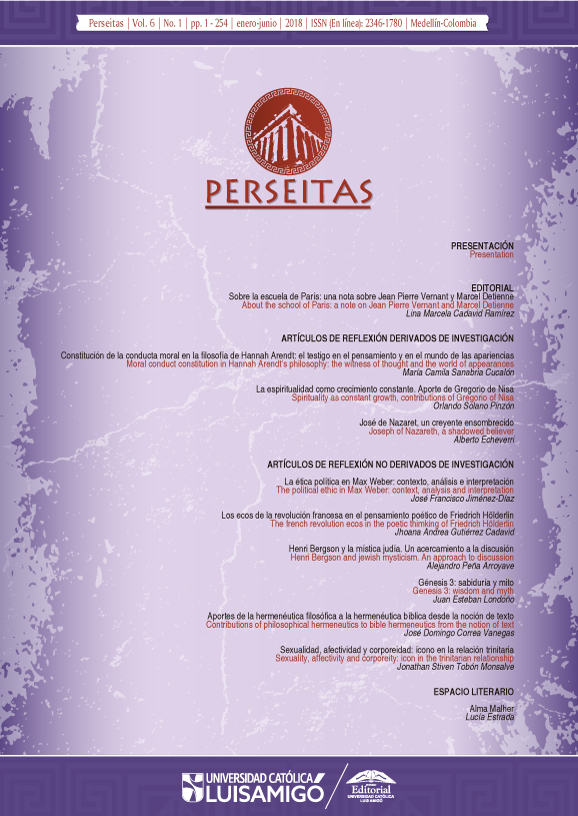Constitución de la conducta moral en la filosofía de Hannah Arendt: el testigo en el pensamiento y en el mundo de las apariencias
DOI:
https://doi.org/10.21501/23461780.2681Palabras clave:
Conciencia moral, Conducta moral, Hannah Arendt, Pensamiento, Testigo, VoluntadResumen
El presente texto se propone resaltar la figura del testigo en la conducta moral,
partiendo del presupuesto de que dicha conducta se constituye tanto en el
pensar como en el actuar. Para ello se comenza mostrando la participación de
las facultades de la memoria y la imaginación en la concepción arendtiana de
“conciencia moral”, teniendo en cuenta sus distintas facetas. Más adelante, se
ofrece una descripción del actuar de dicha conciencia tanto en el pensamiento
como en el mundo de las apariencias, haciendo énfasis en la faceta del testigo.
Puesto que la conducta moral implica un determinado comportamiento en el
mundo de las apariencias, se abordará la facultad de la voluntad como condición
de dicha conducta. Finalmente, se argumentará que la influencia de la conciencia
en la voluntad está condicionada por la presencia del testigo.
Descargas
Referencias
Arendt, H. (2002). La vida del espíritu. Barcelona: Paidós.
Arendt, H. (2003). Conferencias sobre la filosofía política de Kant. Barcelona: Paidós.
Arendt, H. (2005). La condición humana. Barcelona: Paidós.
Arendt, H. (2007). Responsabilidad y juicio. Barcelona: Paidós.
Arendt, H. (2011). Eichmann en Jerusalén. Barcelona: Debolsillo.
Beiner, R. (2003). “Hannah Arendt y la facultad de juzgar”. En Ronald Beiner. (Ed.) Conferencias sobre la filosofía política de Kant (pp. 157-270). Barcelona: Paidós.
Camps, V. (2006). “La moral como integridad”. Manuel Cruz (Ed.) El siglo de Hannah Arendt. (pp. 63-86). Barcelona, España: Paidós.
Comesaña Santalices, G. y Cure de Montiel, M. (2006) “El pensamiento como actividad según Hannah Arendt”, Utopía y Praxis Latinoamericana, (35), 11-30.
Cruz, M. (2006). “Memoria: ¿extrañeza o reconciliación? (Una meditación en compañía de Hannah Arendt)”. En Cruz, M. (Comp.). El siglo de Hannah Arendt (pp. 87-105). Barcelona: Paidós.
González, J. (2010). “El pensar socrático y las distinciones morales”, Saga (22), 93-101.
Lenis, J. F. (2009). “Hannah Arendt: conciencia moral y banalidad de la condición humana”, Co-herencia, 6(11), 29-38.
Sanabria Cucalón, M. (2017). Noción arendtiana de “Banalidad del mal” a partir de la idea de irreflexividad. Ágora papeles de filosofía, 36 (2).
Publicado
Cómo citar
Número
Sección
Licencia
Derechos de autor 2018 Perseitas

Esta obra está bajo una licencia internacional Creative Commons Atribución-NoComercial-SinDerivadas 4.0.
La revista y los textos individuales que en esta se divulgan están protegidos por las leyes de copyright y por los términos y condiciones de la Licencia Creative Commons Atribución-No Comercial-Sin Derivar 4.0 Internacional.

















